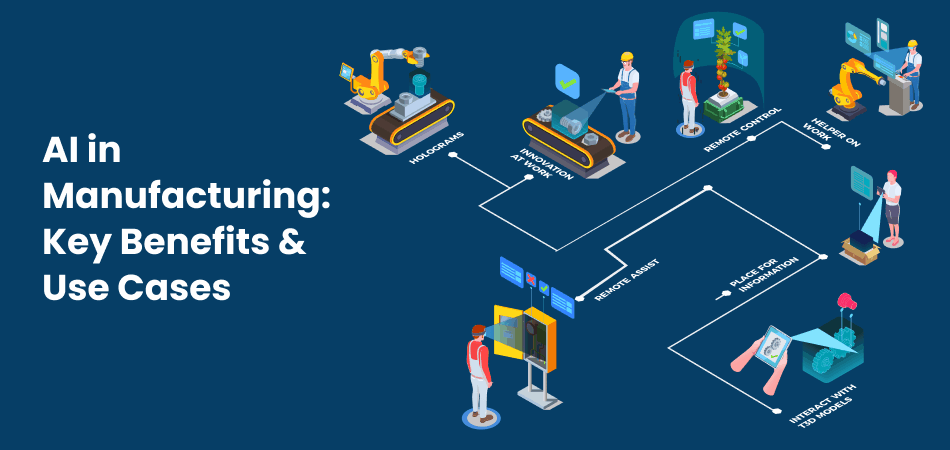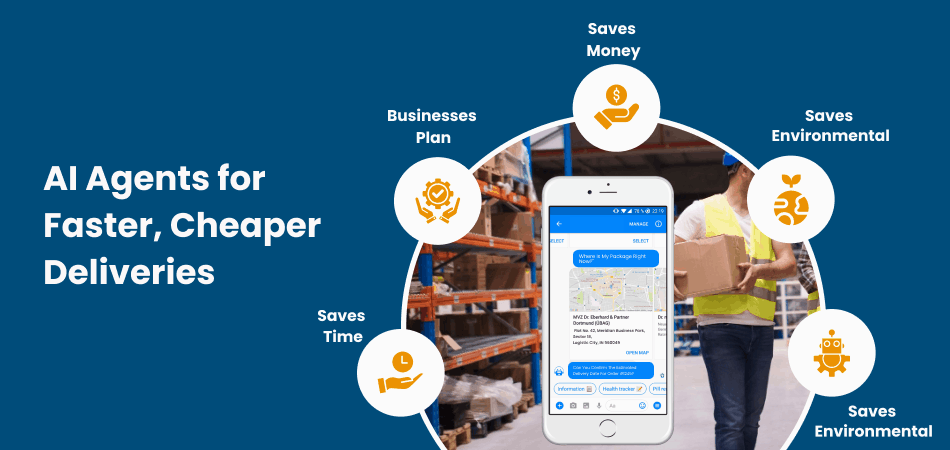Artificial Intelligence (AI) is at the center of a revolutionary shift in the manufacturing sector. AI is changing the way products are designed, manufactured, and delivered through intelligent supply chains, automated quality control, and predictive maintenance.Over 60% of manufacturing businesses worldwide are already utilizing AI to some degree as of 2025, and this percentage is rising quickly. AI is the brain behind the intelligent machines that drive Industry 4.0, also known as the Fourth Industrial Revolution.
Important Use of AI in Manufacturing
Predictive Maintenance
Instead of waiting for a machine to break down, manufacturers are increasingly using AI to predict when it will happen.
According to McKinsey, predictive maintenance can reduce maintenance costs by 25% and unplanned downtime by 50%.
Quality Inspection with Computer Vision
AI-powered computer vision systems scan for defects in products faster and more accurately than human inspectors.
Supply Chain Optimization
AI helps manufacturers forecast demand, optimize logistics, and manage inventory with higher accuracy.
Robotics and Automation
AI-powered robots work alongside humans in factories, learning and adapting to new tasks with minimal programming.
Generative Design & Product Development
AI algorithms can generate multiple design alternatives based on specific constraints, drastically reducing time-to-market.

2. Benefits of AI in Manufacturing
| Benefit | Impact |
| Increased Productivity | AI speeds up operations and reduces downtime |
| Better Quality Control | Automated defect detection and process optimization |
| Smarter Decisions | Real-time insights from machine data |
| Cost Savings | Lower maintenance, labor, and material costs |
| Sustainability | Optimized energy usage and reduced waste |
3. Challenges to Adoption
Despite the potential, AI adoption in manufacturing comes with challenges:
- Data Silos – Lack of centralized data across operations
- Skilled Workforce Gap – Need for AI specialists in traditional factories
- Integration Costs – Upgrading legacy systems can be expensive
But with government initiatives like India’s PLI (Production Linked Incentive) and Europe’s AI strategy, more SMEs are making the leap toward intelligent manufacturing.
4. The Future of AI in Manufacturing
By 2030, AI is expected to add $3.8 trillion in value to the manufacturing sector globally (PwC). As more manufacturers digitize their operations, AI will be the catalyst for:
- Hyper-personalized products
- Self-healing machines
- Autonomous factories
FAQs
1. How is AI used in manufacturing?
AI is used in manufacturing for:
- Predictive maintenance
- Quality inspection using computer vision
- Demand forecasting and supply chain optimization
- Robot automation
- Generative design and smart product development
These applications help improve efficiency, reduce downtime, and increase profitability.
2. What are the benefits of using AI in manufacturing?
Key benefits include:
- Reduced operational costs
- Improved product quality
- Faster decision-making using real-time data
- Enhanced workforce productivity
- Lower energy consumption and waste
3. What is predictive maintenance in manufacturing?
Predictive maintenance uses AI to analyze sensor and equipment data to predict when a machine might fail. This allows timely repairs and avoids unplanned downtime.
4. Is AI only for large manufacturing companies?
No. While large manufacturers were early adopters, AI solutions are becoming more accessible and affordable for small and medium-sized enterprises (SMEs) through cloud-based tools and industrial IoT platforms.
5. Which companies are leading in AI-powered manufacturing?
Some leaders include:
- Tesla – robotic assembly lines and autonomous manufacturing
- Siemens – AI-driven supply chains and smart factories
- GE – predictive maintenance and AI analytics
- BMW – computer vision for defect detection
Conclusion:
Artificial Intelligence is no longer a futuristic concept—it’s the present and future of manufacturing. Whether it’s predicting equipment failures, enhancing quality control, optimizing supply chains, or enabling fully automated factories, AI is driving efficiency, agility, and innovation like never before.
Companies that embrace AI today are setting themselves up for long-term success—by reducing costs, increasing productivity, and staying competitive in a fast-evolving global market. The sooner manufacturers integrate AI into their operations, the better prepared they’ll be to meet the demands of Industry 4.0 and beyond.



